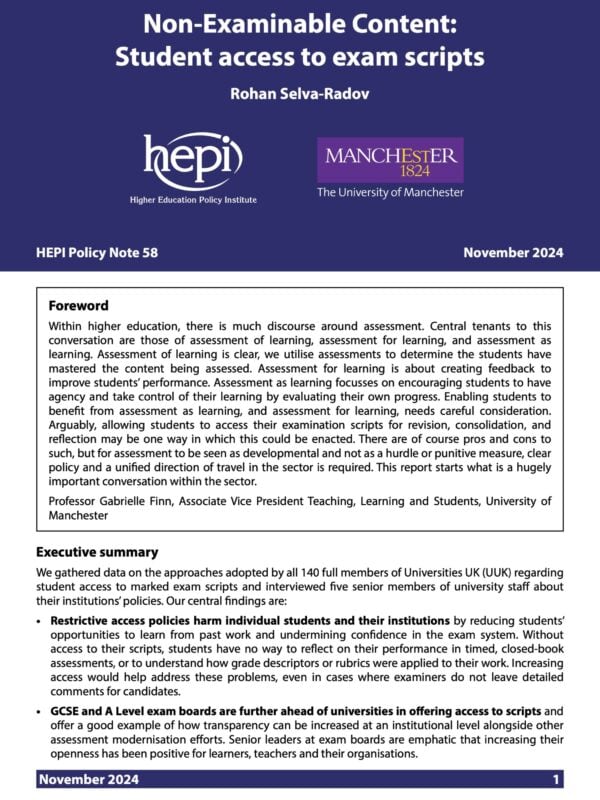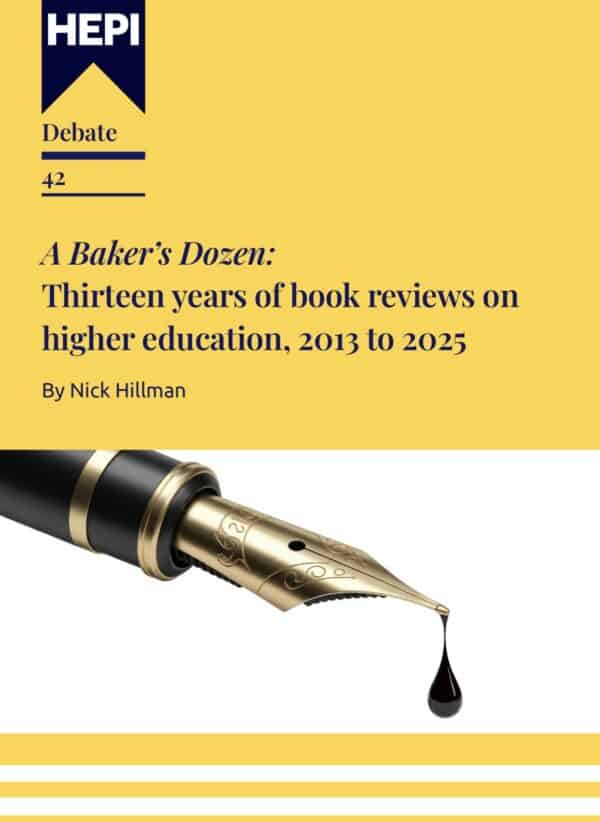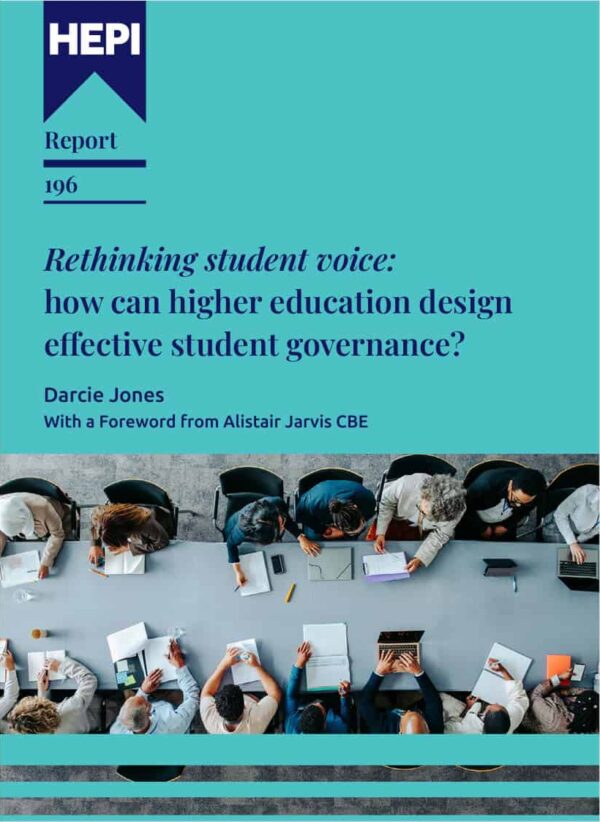Non-Examinable Content: Student access to exam scripts
Universities’ current policies on letting students access their marked exam scripts are harming individual students and institutions, according to a new report published today by the Higher Education Policy Institute (HEPI) and sponsored by the University of Manchester. The report, Non-Examinable Content: Student access to exam scripts (HEPI Policy Note 58) by Rohan Selva-Radov, calls on universities to improve confidence and transparency in their assessment processes by routinely giving students to access their scripts.
Key findings:
- Restrictive access policies harm individual students and their institutions by reducing students’ opportunities to learn from past work and undermining confidence in the exam system.
- GCSE and A-Level exam boards are further ahead of universities in offering access to scripts and offer a good example of how transparency can be increased at an institutional level alongside other assessment modernisation efforts. Senior leaders at exam boards are emphatic that increasing openness has been positive for learners, teachers and their organisations.
- Barely over half of universities (52%) have a published policy on students’ access to exam scripts. Even among universities with a published policy, the level of centralisation differs substantially, with universities split evenly between those which set a single institution-wide policy (53%) and those which leave the decision about whether or how to facilitate access up to exam schools and faculties (47%).
- Policies vary significantly between universities. The most common approach from universities with a published policy is to give all students the right to view their script under controlled conditions but to prohibit them from making any copies. However, this arrangement is in place at only one-in-six institutions (17%), demonstrating substantial heterogeneity.
- Universities’ concerns about increasing access can be mitigated by the use of technology. The move towards online exams allows scripts to be made available automatically with few administrative overheads, and also makes it easier for examiners to leave constructive comments on student work.
Recommendations:
- All universities should publish a policy outlining their approach to student access to exam scripts, with input from individual exam schools and faculties. While the policy need not be overly prescriptive and may include discretion as appropriate, it should nonetheless set out clear principles around feedback and exam access for department-level policies to follow.
- The default position should be that students are able to view, make copies of and share their scripts, with the minimal restrictions necessary imposed in exceptional cases where permitting full access would incur excessive cost.
- Universities should consider adopting technologies that help automate giving candidates access to scripts, as part of assessment modernisation efforts.
Rohan Selva-Radov, the author of the new Policy Note, said:
The newly gathered data in this report reveal a pressing need for greater transparency and consistency from universities in how they approach student access to exam scripts. As expectations on higher education institutions continue to evolve, it’s crucial that assessment practices keep pace, fostering a culture of openness and continuous improvement
Many of the senior university staff I spoke with identified historic inertia as a major reason behind restrictive policies remaining in place, while also stressing that new technologies offer a great opportunity for low-cost improvements in this area.
Professor Gabrielle Finn, Associate Vice-President for Teaching, Learning and Students at the University of Manchester, which sponsored the new Policy Note, said:
This report is hugely important in terms of starting a transparent conversation within the sector on exam script access.
For students to see assessment as a learning opportunity, we must encourage them to have agency over their learning.
The ability to learn from their assessments is one way in which this can be achieved.
Nick Hillman, Director of HEPI, said:
The issue of transparency in exams is not discussed within higher education as much as we believe it should be. It is one area where the higher education sector seems to have fallen way behind schools.
Students benefit from knowing how their marks have been arrived at and can learn vital things from the assessment process.
This report is a wake-up call for institutions to look again at their practices and for policymakers to consider if clearer guidance is needed.
Notes to editors
HEPI was founded in 2002 to influence the higher education debate with evidence. We are UK-wide, independent and non-partisan. We are funded by organisations and higher education institutions that wish to support vibrant policy discussions, as well as through our own events. HEPI is a company limited by guarantee and a registered charity.








Comments
Niels Walet says:
I am seriously underwhelmed by this briefing note. There is a lot on the upside of releasing all of this, but very little on the downside. I agree everyone should get a chance to see their exams, but my agreement stops there.
We are in a difficult transition period, with more -and-more assessment types falling to AI approaches.
A-levels, with a small number of exams for very large cohorts of students being assessed on relatively general knowledge are very different to University exams with much more specialisation and smaller cohorts, so that we would not want to release all details of our examinations.Using an author without experience of the producer side of university exams may have led to a somewhat on- sided view.
Reply
Rose Stephenson says:
Hi Niels, What are the downsides of releasing details of the examinations? It is a concern over questions being shared for future years? I’m interested in your thoughts. You would be welcome to pen a blog in response to this paper, if you have a counter-argument! Best wishes, Rose (HEPI).
Reply
Add comment